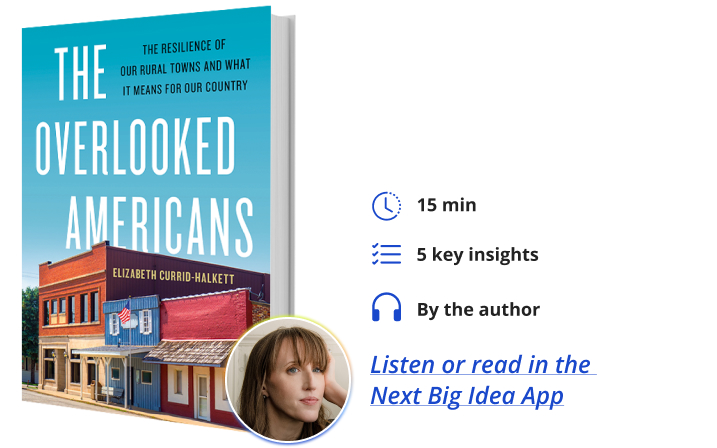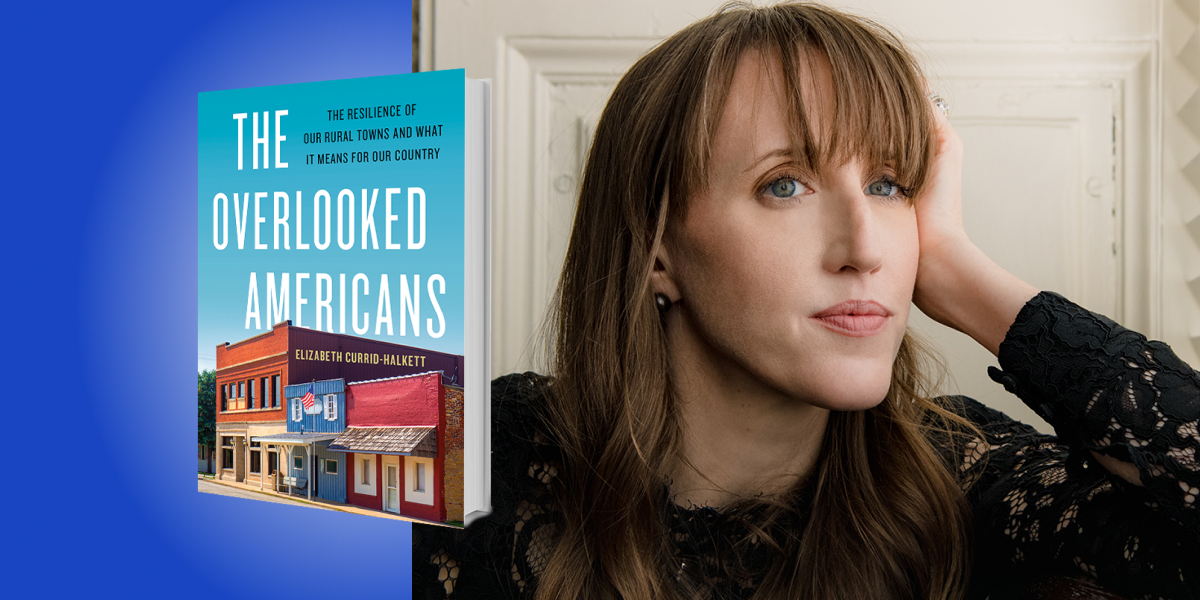Elizabeth Currid-Halkett is the James Irvine Chair in Urban and Regional Planning and professor of public policy at the Price School at the University of Southern California. A recipient of a 2023 Guggenheim Fellowship, she holds the Kluge Chair in Modern Culture at the Library of Congress. Currid-Halkett’s work has been featured in the New York Times, Wall Street Journal, the Economist, and the New Yorker.
Below, Elizabeth shares 5 key insights from her new book, The Overlooked Americans: The Resilience of Our Rural Towns and What It Means for Our Country. Listen to the audio version—read by Elizabeth herself—in the Next Big Idea App.

1. Rural Americans are open-minded and tolerant.
Rural Americans are often castigated as backward and intolerant, even racist. But in my conversations with rural and urban Americans, I found they shared many common values around equality, democracy, the environment, and the importance of family. Statistics back these observations.
Based on the University of Chicago’s General Social Survey (GSS), rural and urban Americans share many of the same views on most topics. In fact, rural Americans were as tolerant and supportive, if not more, of social policy towards the uplifting of women and the Black community. For example, 21.4 percent of rural Americans with a bachelor’s degree agree that the government should support the Black community, while that figure is 19.8 percent for those who live in cities. According to the GSS, the greatest advocates for supporting preferential hiring for Blacks are rural Americans with less than a high school education, not the educated and urban as is the conventional wisdom. Almost 80 percent of rural residents agree or strongly agree that women should be hired and promoted. That figure is 73 percent for urban Americans. Both urban and rural Americans are equally disenchanted with our government: 47 percent of urban and 44 percent of rural respondents have “hardly any” confidence in the executive branch. Rural and urban Americans are similarly religious and similarly spiritual.
This blur of statistics shares something very crucial: Rural Americans are not intolerant and backward. Their responses are similar to those of their urban counterparts and sometimes show even more openness on issues of gender and race.
2. Rural Americans didn’t vote for Trump necessarily, they simply voted Republican.
Why does rural America vote Republican? A mythology persists around Trump’s sway over rural America. In reality, as the work of political scientists Noam Lupu and Nicholas Carnes found, over the past several decades, rural America has been inching more Republican with each election cycle. Reagan, both Bushes, and Romney were all supported by rural America. The question might be not whether rural America is voting against its own interests but rather what interests rural America is voting in favor of.
“Rural Americans I spoke to expressed reservations about being told how to think and what to say.”
Culture matters a lot. It is important that potential rural voters feel like they belong. Wokeism, zealot Progressivism, and the superiority of the meritocracy alienate rural Americans. Rural Americans I spoke to expressed reservations about being told how to think and what to say. As one man from Missouri expressed, “The truth is, Elizabeth, we don’t feel left behind. We want to be left alone.”
3. Rural Americans just want to be treated with respect.
No one owns rural America’s vote. While rural Americans have tended to vote Republican, we assume incorrectly that all of these votes are cast with strong emotion. Many rural Republicans—like many Democrats—vote for the party out of habit and generalized support. Most rural Americans are moderate.
If Republicans want to keep the rural vote, they need to ditch the far right, which does not align with the values of the many rural Americans I spoke to. If Democrats want to gain a foothold in rural America, they need to stop looking down on the people within it. As the great, late Harvard philosopher Judith Shklar observed, small daily cruelties can be the worst sort of pain. For some rural Americans, they are only too aware of how they are conveyed in the media by the liberal elite.
4. For the most part, rural Americans are doing fine.
Rural America may have voted for Trump but not because it is angry and poor. Data on rural America’s median income, home ownership, and unemployment show that they are doing as well, if not better, than their urban counterparts. Even if we look at the jobs powering rural America, we find that many of the professional and knowledge-intensive industries, such as finance and technology, have made their way into rural America, suggesting these two geographies may not be so distant, after all.
“Taking into account the cost of living, rural American median incomes are on par with our cities.”
For example, unemployment rates are across the board lower in rural America. Homeownership is almost universally higher in rural America and inequality is less in rural America. Taking into account the cost of living, rural American median incomes are on par with our cities. Despite the increased importance of college degrees, many rural Americans are carving a life for themselves (buying a home, raising a family, and making decent money) without one.
There are parts of rural America that are suffering, namely Appalachia and the South, but these places need to be looked at separately and with care. Our current gross generalizations of rural America are misrepresentative and unhelpful.
5. Rural Americans, like all of us, are contradictions and multitudes.
I interviewed a woman from Kentucky who was anti-vaccine, anti-climate change, and wary of gay marriage. I interviewed a woman from Kentucky whose dream in life was to open an orphanage for children who lost parents to the opioid crisis, who said that if she had all the money in the world she would buy teeth for those who lost theirs due to drug addiction, and who emailed me to say hello every once in a while and to thank me for the research I was doing. What if I told you these two women are the same person?
I interviewed an avid Republican from Wisconsin who voted for Trump twice. What if I told you his answers to my interview questions on democracy, racism in America, and marriage equality were no different from those of the Wisconsin Progressive public defender who disdained Trump? People are multitudes and contradictions. Our stereotypes are doing us a disservice.
To listen to the audio version read by author Elizabeth Currid-Halkett, download the Next Big Idea App today:
































